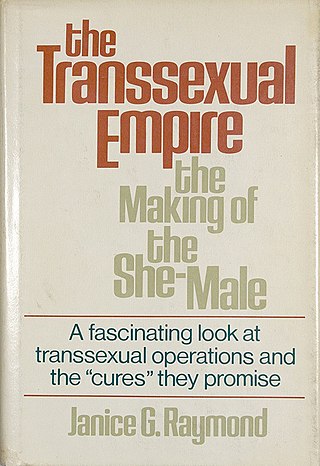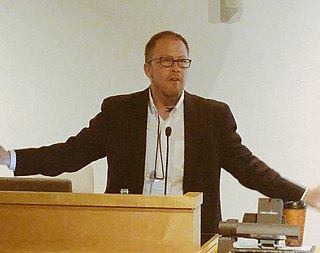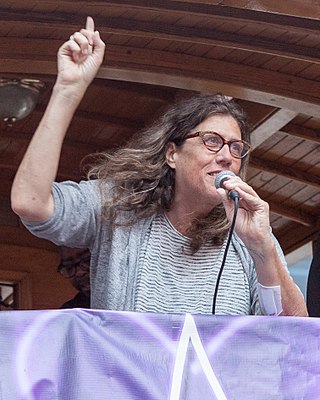Related Research Articles
A cisgender person is someone whose gender identity corresponds to their sex assigned at birth, i.e., someone who is not transgender. The prefix cis- is Latin and means on this side of. The term cisgender was coined in 1994 as an antonym to transgender, and entered into dictionaries starting in 2015 as a result of changes in social discourse about gender. The term has been and continues to be controversial and subject to critique.

Transphobia consists of negative attitudes, feelings, or actions towards transgender people or transness in general. Transphobia can include fear, aversion, hatred, violence or anger towards people who do not conform to social gender roles. Transphobia is a type of prejudice and discrimination, similar to racism, sexism, or ableism, and it is closely associated with homophobia. Transgender people of color can experience many different forms of discrimination simultaneously.

Transfeminism, or trans feminism, is a branch of feminism focused on transgender women and informed by transgender studies. Transfeminism focuses on the effects of transmisogyny and patriarchy on trans women. It is related to the broader field of queer theory. The term was popularized by Emi Koyama in The Transfeminist Manifesto.

Sexual attraction to transgender people has been the subject of scientific study and social commentary. Psychologists have researched sexual attraction toward trans women, trans men, cross dressers, non-binary people, and a combination of these. Publications in the field of transgender studies have investigated the attraction transgender individuals can feel for each other. The people who feel this attraction to transgender people name their attraction in different ways.

Gayle S. Rubin is an American cultural anthropologist, theorist and activist, best known for her pioneering work in feminist theory and queer studies.
Sheila Jeffreys is a former professor of political science at the University of Melbourne, born in England. A lesbian feminist scholar, she analyses the history and politics of human sexuality.

The Transsexual Empire: The Making of the She-Male is a 1979 book critical of transsexualism by American radical feminist author and activist Janice Raymond. The book is derived from Raymond's dissertation, which was produced under the supervision of the feminist theologian Mary Daly.

Griselda Frances Sinclair Pollock is an art historian and cultural analyst of international, postcolonial feminist studies in visual arts and visual culture. Since 1977, Pollock has been an influential scholar of modern art, avant-garde art, postmodern art, and contemporary art. She is a major influence in feminist theory, feminist art history, and gender studies. She is renowned for her innovative feminist approaches to art history which aim to deconstruct the lack of appreciation and importance of women in art as other than objects for the male gaze.
Trish Salah is an Arab Canadian poet, activist, and academic. She is the author of the poetry collections, Wanting in Arabic, published in 2002 by TSAR Publications and Lyric Sexology Vol. 1, published by Roof Books in 2014. An expanded Canadian edition of Lyric Sexology, Vol. 1 was published by Metonymy Press in 2017.

Paisley Currah is political scientist and author, known for his work on the transgender rights movement. His book, Sex Is as Sex Does: Governing Transgender Identity examines the politics of sex classification in the United States. He is a professor of political science and women's and gender studies at Brooklyn College and the Graduate Center of the City University of New York. He was born in Ontario, Canada, received a B.A. from Queen's University at Kingston, Ontario and an M.A and Ph.D. in Government from Cornell University. He lives in Brooklyn.

Sheila L. Cavanagh is a Canadian academic, playwright, and psychotherapist doing a psychoanalytic formation at the Lacan School in San Francisco. She is a professor of sociology and former chair of the Sexuality Studies Program at York University. Cavanagh teaches courses in gender studies, sexuality studies, feminist theory, psychoanalysis, and queer theory. She is best known for her book Queering Bathrooms: Gender, Sexuality, and the Hygienic Imagination (2010) and for a special double-issue she edited on Trans-Psychoanalysis in TSQ: Transgender Studies Quarterly.

Transmisogyny, otherwise known as trans-misogyny and transphobic misogyny, is the intersection of transphobia and misogyny as experienced by trans women and transfeminine people. The term was coined by Julia Serano in her 2007 book Whipping Girl to describe a particular form of oppression experienced by trans women. In an interview with The New York Times, Serano explores the roots of transmisogyny as a critique of feminine gender expressions which are "ridiculed in comparison to masculine interests and gender expression."

Susan O'Neal Stryker is an American professor, historian, author, filmmaker, and theorist whose work focuses on gender and human sexuality. She is a professor of Gender and Women's Studies, former director of the Institute for LGBT Studies, and founder of the Transgender Studies Initiative at the University of Arizona, and is currently on leave while holding an appointment as Barbara Lee Distinguished Chair in Women's Leadership at Mills College. Stryker serves on the Advisory Council of METI and the Advisory Board of the Digital Transgender Archive. Stryker, who is a transgender woman, is the author of several books about LGBT history and culture. She is a leading scholar of transgender history.
Feminist views on transgender topics vary widely.
Transgender studies, also called trans studies or trans* studies, is an interdisciplinary field of academic research dedicated to the study of gender identity, gender expression, and gender embodiment, as well as to the study of various issues of relevance to transgender and gender variant populations. Interdisciplinary subfields of transgender studies include applied transgender studies, transgender history, transgender literature, transgender media studies, transgender anthropology and archaeology, transgender psychology, and transgender health. The research theories within transgender studies focus on cultural presentations, political movements, social organizations and the lived experience of various forms of gender nonconformity. The discipline emerged in the early 1990s in close connection to queer theory. Non-transgender-identified peoples are often also included under the "trans" umbrella for transgender studies, such as intersex people, crossdressers, drag artists, third gender individuals, and genderqueer people.

TERF is an acronym for trans-exclusionary radical feminist. First recorded in 2008, the term TERF was originally used to distinguish transgender-inclusive feminists from a group of radical feminists and social conservatives who reject the position that trans women are women, including trans women in women's spaces, and transgender rights legislation. Trans-inclusive feminists assert that these ideas and positions are transphobic and discriminatory towards transgender people. The use of the term TERF has since broadened to include reference to people with trans-exclusionary views who are not necessarily involved with radical feminism.

TSQ: Transgender Studies Quarterly is a quarterly peer-reviewed academic journal covering transgender studies, with an emphasis on cultural studies and the humanities. Established in 2014 and published by Duke University Press, it is the first non-medical journal about transgender studies.
The NeuroGenderings Network is an international group of researchers in neuroscience and gender studies. Members of the network study how the complexities of social norms, varied life experiences, details of laboratory conditions and biology interact to affect the results of neuroscientific research. Working under the label of "neurofeminism", they aim to critically analyze how the field of neuroscience operates, and to build an understanding of brain and gender that goes beyond gender essentialism while still treating the brain as fundamentally material. Its founding was part of a period of increased interest and activity in interdisciplinary research connecting neuroscience and the social sciences.
Discrimination against transgender men and transmasculine individuals, sometimes referred to as transandrophobia, anti-transmasculinity, or transmisandry, is a similar concept to transmisogyny and discrimination against non-binary people. Transmisogyny, discrimination against transgender men and discrimination against nonbinary people are types of transphobia which affect trans women, trans men and nonbinary people respectively.
Gender-critical feminism, also known as trans-exclusionary radical feminism or TERFism, is an ideology or movement that opposes what it refers to as "gender ideology": the concept of gender identity and transgender rights, especially gender self-identification. Gender-critical feminists believe that sex is biological and immutable, while believing gender, including both gender identity and gender roles, to be inherently oppressive. They reject the concept of transgender identities. These views have been described as transphobic by feminist and scholarly critics, and are opposed by many feminist and LGBT rights organizations.
References
- 1 2 3 4 5 Ehnsmyr, Ester (November 3, 2011). "How can art shape science, and how can science shape art?". Centre for Gender Research Uppsala University. gender.uu.se. Archived from the original on January 12, 2014.
- ↑ Licona, Adela C.; Hayward, Eva S. (December 17, 2014). "Trans~Waters~ Coalitional Thinking on Art + Environment". Terrain.org.
- 1 2 "Eva Hayward, The Department of Gender & Women's Studies". gws.arizona.edu. Retrieved January 11, 2018.
- ↑ "Graduates of the Santa Cruz University California". histcon.ucsc.edu. March 2015. Archived from the original on 22 June 2015.
- ↑ "Cinematic Arts Fall 2008 APR Unit Response Report and Initial Action Plan". Academic Program Review, UNM. 2008. p. 9. Retrieved January 10, 2018.
- ↑ Joy, Eileen (2014). "01_Toxic Sexes_FINAL" (PDF). static1.squarespace.com. p. 8. Archived from the original (PDF) on May 3, 2021. Retrieved 2018-01-12.
- ↑ "Columns, Eva Hayward". Indy Week. Retrieved January 10, 2018.
- ↑ Hayward, Eva (January 30, 2013). "Sex in the Wild (a First-Hand Account)". YES! Magazine. Retrieved January 12, 2018.
- ↑ Hayward, Eva (Autumn 2016). "Cat's Cradle: AIDS, Toxoplasmosis Gondii, and Impurrrfect Love". www.antennae.org.uk. ANTENNAE The Journal of Nature in Visual Culture. Retrieved January 12, 2018.
- ↑ Brown, Daniel (June 21, 2013). "Letter From The Editor, AEQAI". aeqai.com. Retrieved 2018-01-12.